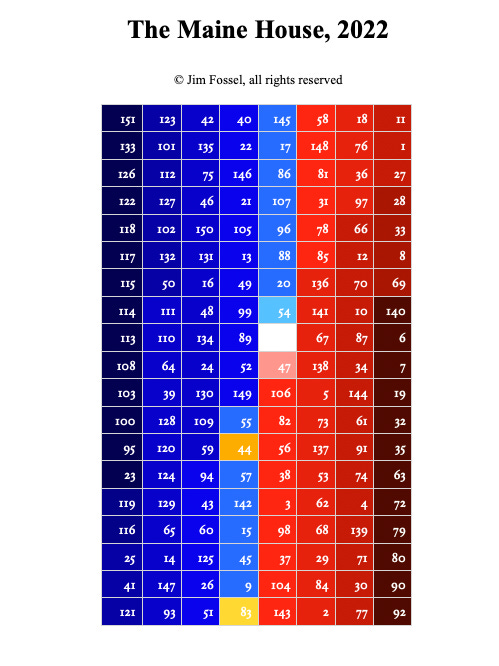How the Maine House was nearly won
Republicans came up just short of flipping the Maine House
We Mainers very nearly woke up to what would have been a startling headline in the Portland Press Herald on Wednesday, November 6:
Republicans Take Control of the Maine House
This probably would have been more shocking to most of us than the results of the presidential election, since all of the polling showed that to be an extremely close contest.1 While liberals were certainly disappointed by the outcome and may have been surprised by the scope, anyone paying attention shouldn’t have been shocked by the overall result. If it had gone the other way, I wouldn’t have been surprised, though I thought Donald Trump would win.
The Maine House of Representatives is an entirely different story. Since there’s no polling on either the overall outcome or on individual races, it was hard to have any sense of where the contest stood. After the disappointing results of the 2022 midterms, when a predicted red wave failed to materialize either in Maine or nationally, the best I was hoping for was that Republicans would be able to keep Democrats from having a Legislative supermajority.

Boy, was I wrong.
As a reminder, here’s where we were after the 2022 midterm elections: Democrats had 82 seats, Republicans had 67, and there were two unenrolled representatives. You can see how that looks graphically below: Republicans are in a shade of red on the right, Democrats are in a shade of blue on the left, and the unenrolled are a shade of orange. The seats are arranged graphically by competitiveness, with the uncontested seats on the far left or right and the closest seats in the middle:
Picking up nine seats to get the majority might not seem like a huge lift, but it really is - it represents five percent of the chamber overall. By comparison, it’s like needing to pick up 5 US Senate seats or more than twenty US House seats.
Going by straight competitiveness, Republicans would have to flip all the seats out to District 83, while defending all of their incumbents. Here’s what that scenario would have looked like:
With that shade of red, we’d be looking at Speaker Billy Bob Faulkingham (R-Winter Harbor) instead of Minority Leader Billy Bob Faulkingham. Obviously, the Republicans didn’t manage that, but they did have a net gain of six seats, leaving the House at 76 Democrats, 73 Republicans, and two unenrolled representatives. So, how did they do it? Did they simply defend all their incumbents and pick up the six most competitive districts? Nope, it wasn’t that simple. Here are the seats that changed hands in 2024, highlighted in green - on both sides of the aisle:
While Republicans did a good job in flipping nine seats, they also lost three seats to Democrats or unenrolled candidates: Districts 47, 98, and 58. If they’d been able to simply keep those three seats, they’d have a one-seat majority. We can also see that Republicans were able to flip a seat deep into Democratic-held territory, District 13 (Ellsworth, Waltham, and Fletchers Landing Township) but didn’t pick up seats that were even more competitive in 2022, like District 96 (Part of Lewiston), where incumbent Michael Lajoie narrowly won re-election by just 39 votes. If they’d defeated him, incumbent Anne-Marie Mastraccio in District 142 (Part of Sanford), who won by 64 votes, and picked up an open seat in District 20 (Part of Brewer), which the Republican only lost by 119 votes, we’d again be looking at Speaker Billy Bob Faulkingham. Here’s what that scenario looks like:
So, Republican Leader Billy Bob Faulkingham certainly has every reason to be pleased with his efforts - he came within a few hundred votes of being Speaker just based on those districts alone, and they weren’t even the three closest!2. If you just look at the three closest districts - 75, 52, and 96 - Republicans came within sixty votes of the majority.
Sixty votes.
Now, I’m not just going over this to torture Billy Bob - he’s a good guy and he’s probably reading this - but to emphasize how close Republicans came to taking the chamber. That wouldn’t have exactly been an enormous red wave, but it would have been a huge shock to the Maine political system. Democrats would no longer be able to simply ignore Republicans in Augusta.
Republicans didn’t just do better in a few competitive districts here and there, either - just as Trump did nationally, they improved their numbers across the board. In more than a hundred of the 151 Maine House districts, Republicans improved their performance over 2022. This wasn’t just in battleground districts, but in safe seats on both sides of the aisle.
Take District 4 (Caribou, Wade, and Washburn), for instance, where first-term Representative Timothy C. Guerrette was running for re-election. He improved his numbers from 63.76% in 2022 to 75.13% in 2024, more than an eleven point swing. In Districct 127 (part of Westbrook), where incumbent Morgan J. Rielly easily won re-election, she still saw her numbers dip slightly, from 71.77% in 2022 to 69.13% in 2024, a 2.64% move towards the Republicans without any effort on their part - slightly more than the statewide average.
This concept, known as the swing, is one that is used often in analysis of legislative chambers all over the world, though relatively infrequently here in Maine. Here’s a graphical look at the swing in District Four (Caribou, Wade, and Washburn) from 2022 to 20243:
Now, here’s the same chart for District 127, showing that it trended Republican as well, just not nearly as much:
The interesting thing about the swing statewide is that it’s difficult to draw any conclusions from it, other than the overall shift towards Republicans. Looking at the ten closest seats that Democrats won - seats that one or both parties should have targeted - there was no real pattern in the swing. Here, a negative percentage is towards Republicans; a positive percentage is towards Democrats.
We see the same in the ten closest Republican wins, only three of which were pickups - lost opportunities on the path to a majority:
Incidentally, those two districts with massive shifts? Those, District 90 and District 108, were districts that were close this time but didn’t have any Republican or Democratic candidate, respectively, last time. That shows how important recruiting is, and why no seat should be left uncontested.
So, Republicans did a great job almost picking up the majority, but it should be clear after pouring through the data that their efforts, while strong, were also inconsistent. The same can be said of Democrats, however: Even though they have a bigger organization, with more volunteers, more money, and more allied groups than the Republicans, they had an issue of inconsistency as well. If either party had a truly excellent and consistent ground game, we’d expect to see a more uniform shift across the ten closest districts on either side - or even on both sides.
Now, what about the twelve total seats that changed hands, the nine Republican pickups, the two Democrat pickups, and the one unenrolled pickup? Well, we know we’ll finally find a trend there, of course - the Republicans gained ground in all the seats they picked up, while Democrats/Unenrolled gained ground where they picked up4.
Even with these seats, though, the trend is not uniform. Some of the shifts were massive towards the victorious party; others were more subtle. District 47, for instance, saw a massive shift towards the Democrats, but that’s easily explainable: in 2022, my father Les Fossel, a former Republican legislator, ran as an unenrolled candidate. Many of his voters moved towards the Democrat, but not uniformly: The Republican incumbent, Edward J. Polewarczyk, did 8 points better than in 2022 as well, but still lost to Wayne K. Farrin.
District 98, another Democratic pickup, was a bit of an anomaly as well. The Republican incumbent, Joseph Galletta, lost in the primary to someone who was more conservative, Guy Lebida, who then narrowly lost in the general election. Had the primary been avoided, Republicans probably would have retained that seat.
In District 58, the Democrats had no candidate, but unenrolled candidate Sharon Frost narrowly defeated Republican incumbent Daniel Newman by 43 votes - good enough for a 3% improvement over his Democratic opponent in 2022. So, even though they managed to pick up three seats, Democrats didn’t do so against a Republican incumbent without some sort of special circumstances coming into play.
It’s hard to say where things in Maine will be politically in two years: We’ll have not only dealt with two more years of Trump in the White House, but we’ll also be looking at a gubernatorial election5, a possibly competitive U.S. Senate race6, and another close contest in the Second Congressional District7. All of that will affect the legislative races in a variety of ways that are impossible to predict right now, never mind the upcoming battle over the state budget.
In the meantime, all both parties can do is buckle up, take a look at where they over performed or under performed in both 2022 and 2024, and try to upgrade their operations for the forthcoming midterm elections. Republicans improved organizationally this cycle, but for a majority they’ll have to be even more consistent and better-prepared - no matter what the state or national mood may be.
Jim is also a weekly columnist for the Portland Press Herald, Maine’s largest daily newspaper. Follow him on X (formerly Twitter) or on Facebook.
Those polls weren’t wrong, by the way. Although the final result looked very good for Donald Trump, it was essentially within the margin of error, which is exactly where the polls were.
222, to be exact, in those three districts.
UOCAVA are oversees absentee voters, an abbreviation for the Uniformed and Overseas Citizens Absentee Voting Act.
I’m grouping the unenrolled candidate who won with the Democrats here; since there was no Democratic candidate in that seat, it seems reasonable.
This will be the topic of an upcoming column or blog post all on its own. Jared Golden might be a good gubernatorial candidate, but he’ll have to win back the support of the progressive wing.
If Janet Mills runs against Susan Collins, the seat will be competitive. There are no other Democrats who stand a chance other than Jared Golden, and it’s hard to see him running against his former employer.
If Jared Golden runs for governor, this will be an especially intriguing contest.







